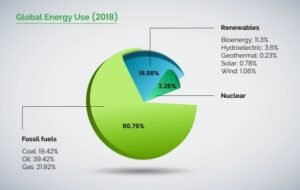 October 14, 2022
October 14, 2022
Fossil Fuels: An Indispensable Energy Resource
Coal, oil, and petroleum are the world’s most widely used fuels. Their ready availability and continuous supply are the primary reason these fuels are highly indispensable. They are nonrenewable resources and constitute more than 70% of the world’s fuel supplies for power generation. Coal and oil reserves are found in depths of the earth and are unequally distributed which significantly affects their pricing and availability across the globe.


Global Energy Use in various End-use Sectors by Type of Fuel (2018) (Source)
Impact Of Fossil Fuels: A Global Challenge Fossil fuels have a large amount of carbon trapped inside them which is released as carbon dioxide (CO2) upon combustion. Identified as one of the primary greenhouse gasses, fossil fuel combustion in industries accounts for more than 80% of global carbon dioxide emissions each year. It is important to understand their impact to evaluate the actual price we are paying for their extensive use for energy generation and transportation. Mining (of coal) and drilling (of liquid and gaseous fossil fuels) are the two predominant ways of fossil fuel extraction. According to an article published in the Union of Concerned Scientists, activities like fracking require about 3-6 million gallons of water per well and close to 15-60 thousand gallons of other chemicals. As per their findings, this is a matter of serious concern as it is likely to have serious implications affecting the whole planet. A great amount of information is also available on how drilling brings water trapped inside the depths of the ground to the surface. Hydrocarbons, radioactive material, and heavy metals trapped in this water make it unfit for human consumption and a challenge to dispose of. For a long time, authorities have been turning a blind eye to how these processes are negatively impacting the environment while posing enormous health risks to the people involved in carrying out these labour-intensive processes. Further, transportation of each type of fossil fuel over long distances from the place of production to the end-user also adds to pollution. It raises serious safety concerns, such as exposure to coal dust, gas leaks in pipelines, and oil spills in oceans, to mention a few. In recent decades, there has been no definite solution to address these challenges. Phasing out Fossil Fuels is one way to Combat its Negative Impact Bioenergy is a form of renewable energy and has shown a lot of potential in mitigating the negative impact of fossil fuels through domestic production. Here is a small example. Energy from loose biomass such as agricultural waste can be aggregated and processed to make Biofuels that are energy dense and burn with more or less the same efficiency as coal. Lower emissions also make them an ideal choice to replace fossil fuels. They can be sourced, processed, and transported locally which greatly reduces their cost of production and transport in comparison to that of fossil fuels. Due to the pressing need to replace fossil fuels, alternative fuels and renewable energy sources have gained a lot of prominence in recent decades. According to the Global Bioenergy Statistics report published in 2020, Bioenergy constituted 11.3% of the overall energy used across all sectors. Fossil fuels remained the highest used energy source comprising over 80% of the overall consumption. The remaining energy sources include solar, wind, and geothermal energy. The global outlook for Bioenergy and its usage in place of fossil fuels looks promising. The Bioenergy sector is growing immensely and the demand for cleaner fuels is gaining traction. Biomass energy is obtained from organic wastes and crops specifically cultivated for Biofuel production. Is Bioenergy Clean Energy? Biomass energy is harnessed through its conversion to Biofuels, such as ethanol and biodiesel. Carbon dioxide emissions from Biofuels are lower than those of fossil fuels and do not have significant environmental impacts. The challenges of harnessing bioenergy from various sources are multifold, although the advancements in research and technology have made it highly feasible. Bioenergy is converted to biopower in the form of heat and electricity. It is currently obtained from many sources, such as plants, crop residues, forest residues, and waste generated from agro-industries. This organic material used for making Biofuels is known as biomass. Biomass can be converted to solid, liquid, and gaseous Biofuels depending on the biomass material used and has proven to be an efficient replacement for several existing fossil fuels. So how is the shift toward bioenergy helping the environment? To understand this, one needs to understand the concept of non-biogenic and biogenic carbon. Biogenic carbon comes from organic sources such as soil, plants, trees, crops, grasses, forests, and different types of organic waste, etc., combustion or decomposition. The carbon dioxide released from these sources will become a part of the biogenic carbon cycle and will be taken up by plants and the cycle will continue. The carbon dioxide emitted from burning fossil fuels, such as coal and oil, which have sequestered carbon for millions of years comes from non-biogenic carbon sources. Their combustion releases enormous amounts of carbon dioxide in a short time which tends to accumulate in the atmosphere and trap heat. As a result, the amount of carbon accumulated over so many years is being released back quickly. This creates an imbalance and leads to environmental pollution. The amount of energy required for the production and extraction of these fuels also negatively impacts the environment. Bioenergy and its Implications on the Environment The gradual shift towards bioenergy and other renewables is evident from the fact that the global production of biomass energy has grown enormously over the past decade. The global demand for Biofuels in 2021 was 157 billion liters and is projected to grow by 28% in the year 2026. The share of biomass energy for power generation, transport, and other applications is currently one-tenth of all the energy sources put together. The impact of bioenergy on the environment can be fully realized only upon its large-scale usage in various sectors, such as transport, direct heat production, and generation of electricity to name a few. According to a group of experts, low-risk biomass such as farm waste, crop residues, and waste that might otherwise end up in landfills can be a vital solution to remedy adverse climate changes resulting from the excessive use of fossil fuels. Biomass is a sustainable energy source. The net carbon emissions from biomass energy are substantially lower than that of fossil fuels. Harnessing biomass energy is helping reduce waste in landfills and pollution from burning farm stubble, which is proving to be a huge upside over the usage of coal and other conventional fuels.347 Views 0 Comments


 December 19, 2022
December 19, 2022
Graphinet Developer
says:Hi